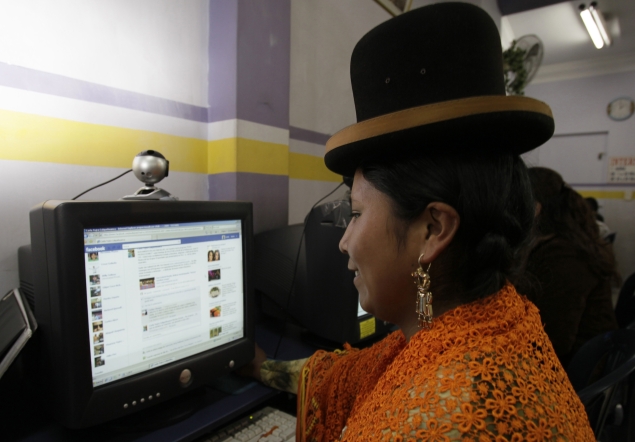- Home
- Social networking
- Social networking News
- Facebook can make you feel envious, lonely and miserable: Study
Facebook can make you feel envious, lonely and miserable: Study

A study conducted jointly by two German universities found rampant envy on Facebook, the world's largest social network that now has over one billion users and has produced an unprecedented platform for social comparison.
The researchers found that one in three people felt worse after visiting the site and more dissatisfied with their lives, while people who browsed without contributing were affected the most.
"We were surprised by how many people have a negative experience from Facebook with envy leaving them feeling lonely, frustrated or angry," researcher Hanna Krasnova from the Institute of Information Systems at Berlin's Humboldt University told Reuters.
"From our observations some of these people will then leave Facebook or at least reduce their use of the site," said Krasnova, adding to speculation that Facebook could be reaching saturation point in some markets.
Researchers from Humboldt University and from Darmstadt's Technical University found vacation photos were the biggest cause of resentment with more than half of envy incidents triggered by holiday snaps on Facebook.
Social interaction was the second most common cause of envy as users could compare how many birthday greetings they received to those of their Facebook friends and how many "likes" or comments were made on photos and postings.
"Passive following triggers invidious emotions, with users mainly envying happiness of others, the way others spend their vacations and socialize," the researchers said in the report "Envy on Facebook: A Hidden Threat to Users' Life Satisfaction?" released on Tuesday.
"The spread and ubiquitous presence of envy on Social Networking Sites is shown to undermine users' life satisfaction."
They found people aged in their mid-30s were most likely to envy family happiness while women were more likely to envy physical attractiveness.
These feelings of envy were found to prompt some users to boast more about their achievements on the site run by Facebook Inc. to portray themselves in a better light.
Men were shown to post more self-promotional content on Facebook to let people know about their accomplishments while women stressed their good looks and social lives.
The researchers based their findings on two studies involving 600 people with the results to be presented at a conference on information systems in Germany in February.
The first study looked at the scale, scope and nature of envy incidents triggered by Facebook and the second at how envy was linked to passive use of Facebook and life satisfaction.
The researchers said the respondents in both studies were German but they expected the findings to hold internationally as envy is a universal feeling and possibly impact Facebook usage.
"From a provider's perspective, our findings signal that users frequently perceive Facebook as a stressful environment, which may, in the long-run, endanger platform sustainability," the researchers concluded.
© Thomson Reuters 2012
Get your daily dose of tech news, reviews, and insights, in under 80 characters on Gadgets 360 Turbo. Connect with fellow tech lovers on our Forum. Follow us on X, Facebook, WhatsApp, Threads and Google News for instant updates. Catch all the action on our YouTube channel.
Related Stories
- Samsung Galaxy Unpacked 2026
- iPhone 17 Pro Max
- ChatGPT
- iOS 26
- Laptop Under 50000
- Smartwatch Under 10000
- Apple Vision Pro
- Oneplus 12
- OnePlus Nord CE 3 Lite 5G
- iPhone 13
- Xiaomi 14 Pro
- Oppo Find N3
- Tecno Spark Go (2023)
- Realme V30
- Best Phones Under 25000
- Samsung Galaxy S24 Series
- Cryptocurrency
- iQoo 12
- Samsung Galaxy S24 Ultra
- Giottus
- Samsung Galaxy Z Flip 5
- Apple 'Scary Fast'
- Housefull 5
- GoPro Hero 12 Black Review
- Invincible Season 2
- JioGlass
- HD Ready TV
- Latest Mobile Phones
- Compare Phones
- Tecno Pova Curve 2 5G
- Lava Yuva Star 3
- Honor X6d
- OPPO K14x 5G
- Samsung Galaxy F70e 5G
- iQOO 15 Ultra
- OPPO A6v 5G
- OPPO A6i+ 5G
- Asus Vivobook 16 (M1605NAQ)
- Asus Vivobook 15 (2026)
- Brave Ark 2-in-1
- Black Shark Gaming Tablet
- boAt Chrome Iris
- HMD Watch P1
- Haier H5E Series
- Acerpure Nitro Z Series 100-inch QLED TV
- Asus ROG Ally
- Nintendo Switch Lite
- Haier 1.6 Ton 5 Star Inverter Split AC (HSU19G-MZAID5BN-INV)
- Haier 1.6 Ton 5 Star Inverter Split AC (HSU19G-MZAIM5BN-INV)







![[Partner Content] OPPO Reno15 Series: AI Portrait Camera, Popout and First Compact Reno](https://www.gadgets360.com/static/mobile/images/spacer.png)









